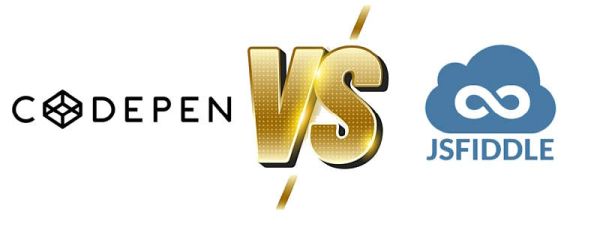JSFiddle.net and CodePen.io are both online HTML-CSS-JavaScript playgrounds to easily test your code. They are both free and don’t require registration. Just add your code and hit the Run button to test it, then Save it to generate a custom URL with your snippets.

When comparing JSFiddle.net and CodePen.io, both platforms provide robust environments for front-end developers to experiment, share, and test code snippets online. However, they cater to slightly different needs and preferences.
JSFiddle.net
JSFiddle is an easy to use, free tool where you can test HTML – CSS – JavaScript in an online interface. Run and save your code and use the custom URL to access it anytime. To make adjustments to the code, simply hit the Save button and the software will record changes increasing the version variable in the link.
To demonstrate how to use it we have created a HTML CSS JavaScript Progress Bar and added the short code to JSFiddle: jsfiddle.net/guh0mf0d/1/
Pros ✅
- Simple Interface: JSFiddle offers a straightforward interface focused on quick testing and prototyping of HTML, CSS, and JavaScript.
- No Registration Required: Users can create and share fiddles without an account, although saving and accessing features like private fiddles do require registration.
- Versioning: JSFiddle tracks changes through versions, allowing users to see and revert to previous states easily.
- Embed Options: Easily embed fiddles into blogs or websites, which is useful for demonstrations and tutorials.
Cons ❌
- Less Social Interaction: JSFiddle is more utilitarian with fewer social features compared to CodePen.
- Limited Customization: While powerful, it lacks some of the advanced customization and design capabilities that CodePen offers.
Codepen.io
Codepen.io is another popular code playground to experiment, easily save and share web code with. This is the very same progress bar code saved with Codepen: codepen.io/anon/pen/KdBBzN
Pros ✅
- Social and Community Features: CodePen has a vibrant community, allowing users to follow each other, comment on pens, and collaborate more interactively.
- Project Management: In addition to single pens, CodePen offers project management features where you can organize multiple files and assets.
- Advanced Customization: CodePen allows users to use preprocessors like Sass, Less, and CoffeeScript, and provides more design-oriented tools.
- Asset Hosting: Users can host images and other assets directly on CodePen, making it a more comprehensive tool for front-end development.
Cons ❌
- Registration for Saving Pens: While you can experiment without an account, saving and other advanced features require registration.
- More Complex Interface: The feature-rich environment might be overwhelming for beginners looking for a quick code test.
Both JSFiddle.net and CodePen.io are excellent tools for front-end development, each with its strengths. JSFiddle is great for quick prototyping and testing, with a simpler interface and versioning system. CodePen excels in community interaction, project management, and advanced customization. Choosing between them depends on whether you prioritize simplicity and quick tests or a rich, community-driven development environment.
Apart from the two most popular editors above we can mention HTML-CSS-JS. Knowing about these online tools you no longer have to copy all documents in one file to share it with somebody else.